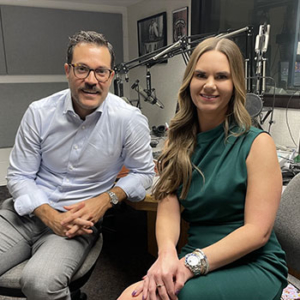 I wanted to reshare this blog post with you because I have recorded a podcast featuring a lot more info on the Rolex brand since I originally posted it. We invited Alex Schlindwein of Kiefer Jewelers, an authorized Rolex dealer, to the studio to talk watch! She shares some great details about the Rolex brand and some tidbits about the value and care of this fine watch. It was a fun podcast for me, and I am a self-admitted fan of the brand. Please check it out, if you are an enthusiast or just want to learn more about this world-renowned brand, enjoy!
I wanted to reshare this blog post with you because I have recorded a podcast featuring a lot more info on the Rolex brand since I originally posted it. We invited Alex Schlindwein of Kiefer Jewelers, an authorized Rolex dealer, to the studio to talk watch! She shares some great details about the Rolex brand and some tidbits about the value and care of this fine watch. It was a fun podcast for me, and I am a self-admitted fan of the brand. Please check it out, if you are an enthusiast or just want to learn more about this world-renowned brand, enjoy!
Aside from the question whether watches of the non-smart variety are even in style at the moment (there’s quite a lot of heated debate on this, despite the popularity of both traditional mechanical watches and modern smartwatches) one major question is: are watches a good investment?
Unfortunately, it’s not a simple “yes or no” answer. Let’s talk about different types of watch investments and what they mean as a buyer, which can help to point you in the right direction. Similar to the market for vintage cars and high-end or specialty furniture, the watch industry has grown significantly. It’s quite common today for investors to make money (or attempt to) through buying and selling watches.
This happens mostly at high-profile auctions, often with brand names you’ve heard of — and sometimes can’t pronounce. Rolex, Patek Phillippe, Audemars Piguet, and Jaeger-LeCoultre are just a few examples. These high-end watches, usually of the mechanical variety, are priced in the tens of thousands all the way up to millions of dollars. Yes, they often have price tags with six zeroes! In 2017, an auction of the Rolex Daytona Paul Newman sold for $17.75 million. How about them apples?
Does this mean every watch will appreciate in value going forward?
In short, no. Only a few very special pieces will double or triple in value, mostly based on the “hype,” or if a specific watch becomes tied to a celebrity or athlete; wristwatches have a long history in film, music, athletics and sport. Next time you see the winner on the podium of a PGA golf tournament, Wimbledon, or a Formula 1 race, take a second and notice the watch the winners are wearing when they lift that trophy. For these types of high-end pieces you may need to know some people with connections to acquire one… and have some very deep pockets as well. In fact, it can be one of the most expensive items a person buys in a lifetime.
How about the average person looking for one nice watch that they would wear in real life?
Many beautiful watches are available at more affordable price points, and if the trend over the past couple of decades continues, it’s likely they will at least retain their value. There are only a few watch brands — more specifically, watch models — that will see an increase in value based simply on their scarcity, or because they are proven classics. They are considered classics because they are testaments to excellent watchmaking, or have some other connection such as to sport or film.
Factors that contribute to a watch’s potential value over time
Perhaps the most famous examples of this are Rolex sports watches. These are in a price bracket that, while not inexpensive, could be considered affordable by the average individual. Even their stainless steel watches (their most popular models) could generally be expected to at least retain their value over time — but also possibly increase — depending on the specifics. They are manufactured to last a lifetime for their owner as well, possibly much longer.
In addition to the known quality, another major factor that contributes to the value of Rolex watches is the deep history of each watch model: the Explorer going to the top of Mount Everest, the Submariner plunging into the depths of the ocean, the GMT for world travelers, the anti-magnetic Milgauss for engineers and scientists. People hear these stories, are captivated, and continue to buy them year after year for thousands of dollars. Consequently, the used market for Rolex watches is a thriving business. You will find that vintage sport Rolex models in general have retained their value or increased in value over time.
Another good example is Omega — producers of the famous Speedmaster “Moonwatch” and Seamaster “James Bond”. Omega watches have a deep and rich history with numerous ties to celebrity, athletics, motorsport, and cinema as well as exhibiting true watchmaking prowess.
Now, I’m not recommending that you go out and immediately buy any of these specific watches! It’s very difficult to predict whether a watch will even retain its value, much less increase in value. These are simply examples of what can contribute to a watch brand or model’s popularity, and affect its long term desirability.
 How quick can I expect to see an ROI on my watch investment?
How quick can I expect to see an ROI on my watch investment?
Watch prices tend not to dramatically increase over a matter of months… or even years. It takes time; see what I did there?
If you believe in a special watch, you’ll need to hang on to it for a long while before you can set the stage for a potential return on your investment.
What else should I know about buying a watch?
No matter what you decide to purchase, spending money on a high-quality watch is a costly endeavor that requires lots of planning and research but can also be very rewarding in a unique way. Here’s some tips:
- Have realistic expectations about the purchase… and its future value. As a vehicle only for financial gain, buying a watch probably isn’t a good bet. An average watch owner or collector usually focuses on acquiring a watch that will provide a lifetime of use and personal enjoyment, that will retain its value should they decide to sell it one day, and even be passed on to heirs if they decide to keep it. If your goal is only to buy low and sell high, be aware of the risks and unpredictability you are bound to face.
- Alongside the financial investment, expect to spend a lot of time researching. You will want to familiarize yourself with the brands, models, and the stories behind them. This will help greatly in making a purchase that is right for you and is likely to retain its value over time.
- Don’t purchase beyond your means. Spending within one’s means is good for financial health in general but applies especially here. Even if you think a watch may be a good investment, it’s not advisable to go into debt or spend more than you can realistically afford on a watch — especially under the assumption that it may increase in value.
- Don’t spend money on a watch just to spend money on a watch. High-end pieces like some of the ones we have discussed here may very likely outlive you; they are designed to last one if not more lifetimes. Whether the right decision for you is to save a bit longer to get something truly special, or if you are happy with fewer, less expensive pieces, it is all up to you and it’s a very personal choice. However, the key is to avoid “buyer’s remorse” by jumping into a large purchase you or your financial plan simply isn’t ready for.
October 2022
Content in this material is for general information only and not intended to provide specific advice or recommendations for any individual. Links provided are for your convenience and are neither endorsed or affiliated with LPL or Allen & Company.




